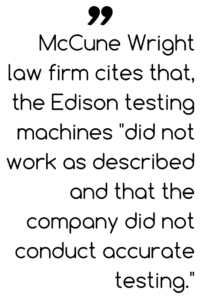 An Arizona resident is suing Theranos for blood testing services that the company offered. The lawsuit, filed in U.S District Court for the Northern District of California by the The plaintiff, M.P.B, bought the said test at a Walgreen’s store in Tempe last December. He says that if he had this knowledge about the Edison testing machines, he would not have bought the test.
An Arizona resident is suing Theranos for blood testing services that the company offered. The lawsuit, filed in U.S District Court for the Northern District of California by the The plaintiff, M.P.B, bought the said test at a Walgreen’s store in Tempe last December. He says that if he had this knowledge about the Edison testing machines, he would not have bought the test.
Theranos, a California start-up offering cheaper blood testing services for STIs, high cholesterol levels, and celiac diseases is being sued for allegedly producing results that were later voided or corrected. This followed a report that was released by Theranos saying that they had voided or corrected some of the results from their Edison machines and those from other vendors between 2014 and 2015. The company also notified doctors and patients that it had voided some results.
The Wall Street Journal first ran the story on test results correction and voiding. This release was followed by a statement from Theranos saying they had taken “comprehensive corrective measures” to tackle issues raised by the Centers for Medicare and Medicaid Services.
The lawsuit states that “As a result, tens of thousands of patients may have been given incorrect blood-test results, been subject to unnecessary or potentially harmful treatments, and been denied the opportunity to seek treatment for a treatable condition,” Theranos are not taking this lightly. The company’s spokeswoman, Brooke Buchanan said that the allegations lack merit and that Theranos will “vigorously defend itself against these claims.”
Theranos has several testing centers in Metro Phoenix, in 40 Walgreen stores. The company lobbied for House Bill 2645, which allows consumers to access lab tests without a physician’s order. When signing the bill in April 2015 at a Theranos location in Scottsdale, Gov. Doug Ducey said it “expands freedoms for people across the state to get the lab tests they need.”
A study that appeared in the Journal of Clinical Investigation found that Theranos lab results were more likely to fall out of ranges when compared with two other laboratories.


